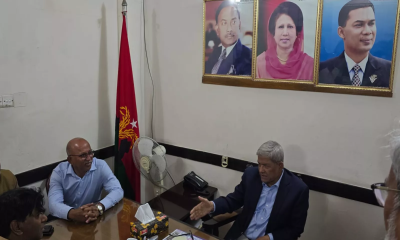In the wake of the 2024 People’s Uprising, Bangladesh’s political landscape is undergoing a profound transformation.
The reforms brought by this uprising promise to make elections more inclusive, but they also signal a shift toward a more challenging political environment.
Let’s take a closer look at the changes and what they mean for the country’s future.
Easier Participation, Tougher Government Formation
One of the most significant changes is that participating in elections will become easier, but forming a government could become more difficult. For the first time, voters will have the option to cast a ‘No’ vote on the ballot paper.
If any seat doesn’t receive at least 40% of the votes, the election for that seat will be canceled, and a new vote will take place.
This new ‘No’ vote option gives the people more power, allowing them to reject candidates they don’t support and forcing political parties to rethink their strategies.
The reforms are expected to take effect in the upcoming elections if the interim government adopts the proposals of the ‘Election System Reform Commission.’
These changes, once implemented, will change the way politics works in Bangladesh, opening the door for more participation but also requiring political leaders to adapt.
Simplified Political Party Registration
The Election System Reform Commission has made it easier for political parties to register for elections.
In the past, political parties had to meet strict criteria, including having offices in at least 21 districts and 200 upazilas, and gathering thousands of members.
Now, the rules are relaxed, allowing parties to register with just 7 districts, 25 upazilas, and a minimum of 5,000 members.
This change will allow more political groups to run for office, giving voters a broader range of choices and increasing competition in national elections.
Independent Candidates: A Simpler Path
For independent candidates, the process of entering elections has also been simplified.
Instead of gathering signatures from 1% of voters in their constituency, candidates now only need 500 signatures to submit with their affidavit.
This will make it easier for new voices to join the political conversation.
Overhauling the Election Process
The reform commission is calling for several major changes to the election process.
One of the most notable proposals is the introduction of a caretaker government system.
This would ensure a neutral, temporary government in place for four months before elections.
The commission has also suggested abolishing the use of electronic voting machines (EVMs) and involving the Ministry of Defense to ensure law enforcement during elections, potentially leading to more secure and fair elections.
The ‘No’ Vote and 40% Vote Threshold
The introduction of the ‘No’ vote is one of the most exciting aspects of the proposed reforms.
Voters who are unhappy with the candidates can cast a ‘No’ vote, and if it wins, the election will be canceled.
A re-election will follow, but with new candidates presented by all political parties.
Additionally, the commission has suggested a 40% vote threshold for parliamentary seats.
If a seat does not meet this requirement, the election for that seat will be canceled, leading to another round of voting.
Making Elections Fairer
The reform commission also recommends banning uncontested elections.
Political parties will be required to choose honest and capable candidates, and they must ensure that candidates are acceptable to voters.
Moreover, political parties will not be allowed to control student, teacher, or labor organizations, and they will be prohibited from having foreign affiliations.
This is aimed at creating a more transparent, accountable political system.
Reducing the Prime Minister’s Powers
The commission is also proposing changes to the powers of the prime minister.
The idea is to limit the prime minister to two terms, ensuring that no one person holds too much power.
Furthermore, the prime minister will not be allowed to hold the roles of party leader and parliamentary leader at the same time.
A Bicameral Parliament: A New Approach
The commission has proposed the creation of a bicameral (two-chamber) parliament.
This would introduce an upper house with 100 members, selected based on proportional representation, and with a minimum age of 35 and at least a bachelor’s degree.
This chamber would ensure more diverse representation, including intellectuals, scientists, workers, and women’s rights activists. At least 40% of the members in the upper house would need to be women.
Meanwhile, the lower house would be expanded to 400 seats, 100 of which would be reserved for women.
A new rotating system would allow women to be directly elected from specific constituencies, ending the current practice of dual representation for women.
Reducing MP Privileges
Another significant change involves reducing the privileges of Members of Parliament (MPs).
The commission suggests eliminating perks like duty-free cars and residential plots.
MPs would also be removed from advisory roles in local government institutions, and special privileges for MPs would be abolished.
These changes are intended to reduce the gap between politicians and the public, creating a more equal political system.
A New Presidential Election Process
The commission has also suggested a new process for electing the president.
Instead of just parliament, the president would be elected by a larger electoral college, including members from both chambers of parliament and all elected local government representatives.
This move is intended to create a more inclusive and fair process for selecting the nation’s leader.
Conclusion: A Glimpse into Bangladesh’s Political Future
The proposed changes will significantly reshape Bangladesh’s political system.
The reforms aim to make elections more transparent and accessible, while ensuring that the political system is fairer and more accountable.
While the process of becoming an elected representative may become more difficult, the hope is that these changes will lead to a more respectful and trustworthy political culture.
As time passes, it will be interesting to see how these recommendations are implemented and what impact they will have on the nation’s political future.
Let`s wait and see what happens next.


-20250210123954.jpg)











-20260304091720.webp)






-20260303080739.webp)










-20260225072312.webp)





-20260228064648.jpg)
